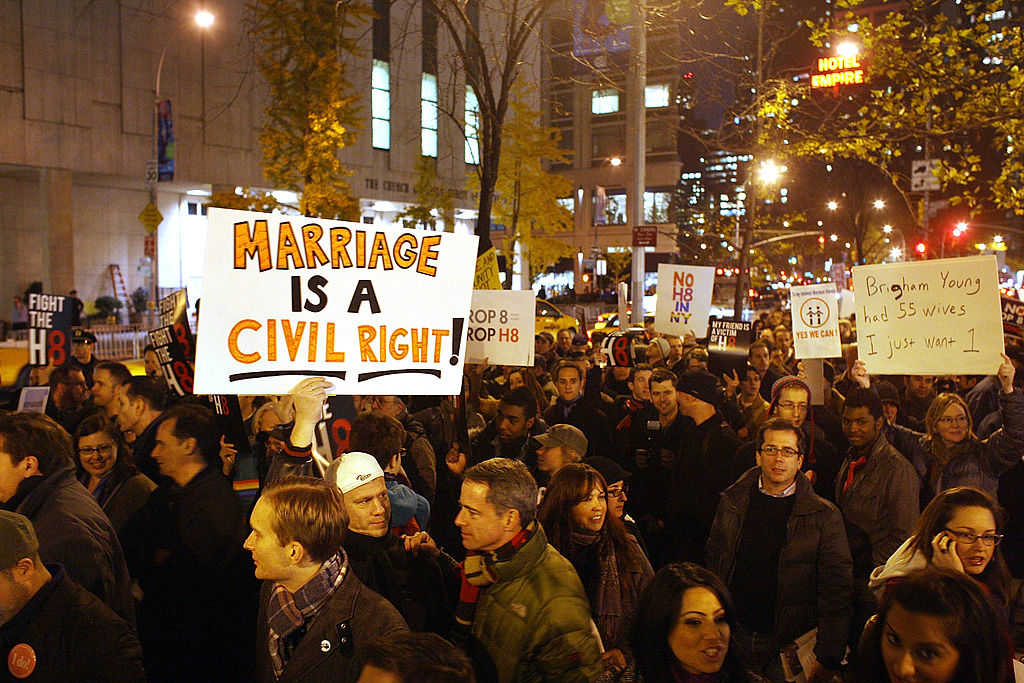When religious freedom and sexual freedom clash, more Americans (48 percent) believe that religious freedom should prevail than sexual freedom (24 percent), according to a new poll released this week by LifeWay Research.
An additional 28 percent said that they aren’t sure whether religious or sexual freedom should win out.
READ: DNA Analysis of Egyptian Mummies May Prove Some Key Old Testament Bible Verses
“It’s clear Americans value religious liberty,” Scott McConnell, executive director of LifeWay Research, said in a statement. “But when it comes to sex, they aren’t sure religion should have the final word. That’s especially true for younger Americans and those who aren’t religious.”
In light of McConnell’s comments, LifeWay found some intriguing differences among subgroups. Those without a faith — the so-called “nones” (49 percent) — are more likely to believe that sexual freedom should trump religious freedom, as are men (30 percent) and 18 to 44 year olds (30 percent). Others, though, overwhelmingly select religious freedom as the more essential right.

Ninety percent of evangelicals, 68 percent of Protestants and 53 percent of southerners believe that religious freedom should be favored over sexual freedom.
LifeWay also asked respondents to note whether they believe the freedom they selected is usually or always more important than the other value they didn’t choose. Those proportions are also fascinating.
“One in 10 Americans say sexual freedom always matters most. Fourteen percent say sexual freedom usually matters most,” the polling firm reported. “Thirty-one percent say religious freedom always matters most, and 17 percent say religious freedom usually matters most.”
One of the other measures LifeWay explored was whether religious individuals are more motivated by faith or hate when it comes to cultural battles over sexuality. Overall, 49 percent said faith and just 20 percent said hate, though 31 percent remained unsure.
McConnell said that the relatively high proportion that selected “hate” is concerning. Read the full results here.
READ: Supreme Court Finally Agrees to Hear Controversial Gay Wedding Cake Case
As Faithwire previously reported, polls can paint a complex picture when it comes to battles between faith and sexuality. For instance, as the debate over whether Christian wedding venders should be allowed to refuse offering same-sex wedding products, a separate poll from PRRI found that 61 percent of Americans oppose allowing small business owners to refuse offering services or selling products to gays or lesbians if these owners feel doing so is a violation of their religious beliefs.
Meanwhile, 30 percent support such an allowance.
It should be noted, though, that PRRI’s question is quite general. Most of the current cultural debates over this issue have to do with either providing products for same-sex weddings or conveying specific messages that Christian printers and other venders are uncomfortable with.
Past polls asking more specifically about exemptions for wedding vendors and not just service more generally have come to starkly different results. In fact, a 2015 AP-GfK poll found that 57 percent of Americans would allow wedding-related businesses to deny services due to the business owners’ religious convictions. At the time, just 39 percent opposed that paradigm.
While dynamics might be changing, it appears responses differ when polling questions get more specific on the matter. Last year, the Pew Research Center found a deep divide among Americans when it came to service-based refusals.
“As a whole, Americans are closely divided over whether businesses that provide wedding services, such as catering or flowers, should be required to provide those services to same-sex couples as they would to any other customer (49 percent), or whether they should be able to refuse those services to same-sex couples if the business owner has religious objections to homosexuality (48 percent),” the polling firm noted.
And as comparisons between datasets and polling firms show, there are certainly other factors at play that could skew the data.
PRRI noted that there’s no majority among any religious group in the U.S. that “favors allowing small business owners to refuse services to gay and lesbian people.”
And while it is true that none of the proportions in that poll among white evangelical Protestants, Mormons, Hispanic Protestants and others crossed the 50 percent threshold on the general question, Pew found something worth noting.
In fact, when the firm looked beyond mere self-described faith labels and explored church attendance, the proportions changed quite a bit.
Pew explains: “There is more of a consensus on this issue among Americans who report attending religious services on a weekly basis. Nearly two-thirds of frequent attenders (63 percent) favor allowing wedding-related businesses to turn away same-sex couples for religious reasons, including 88 percent of churchgoing white evangelicals and 62 percent of churchgoing white mainline Protestants.”
With the Supreme Court set to rule on a case involving a Christian baker refusing a cake for a same-sex wedding ceremony in the fall, the country could soon get more legal clarity on the issue.



